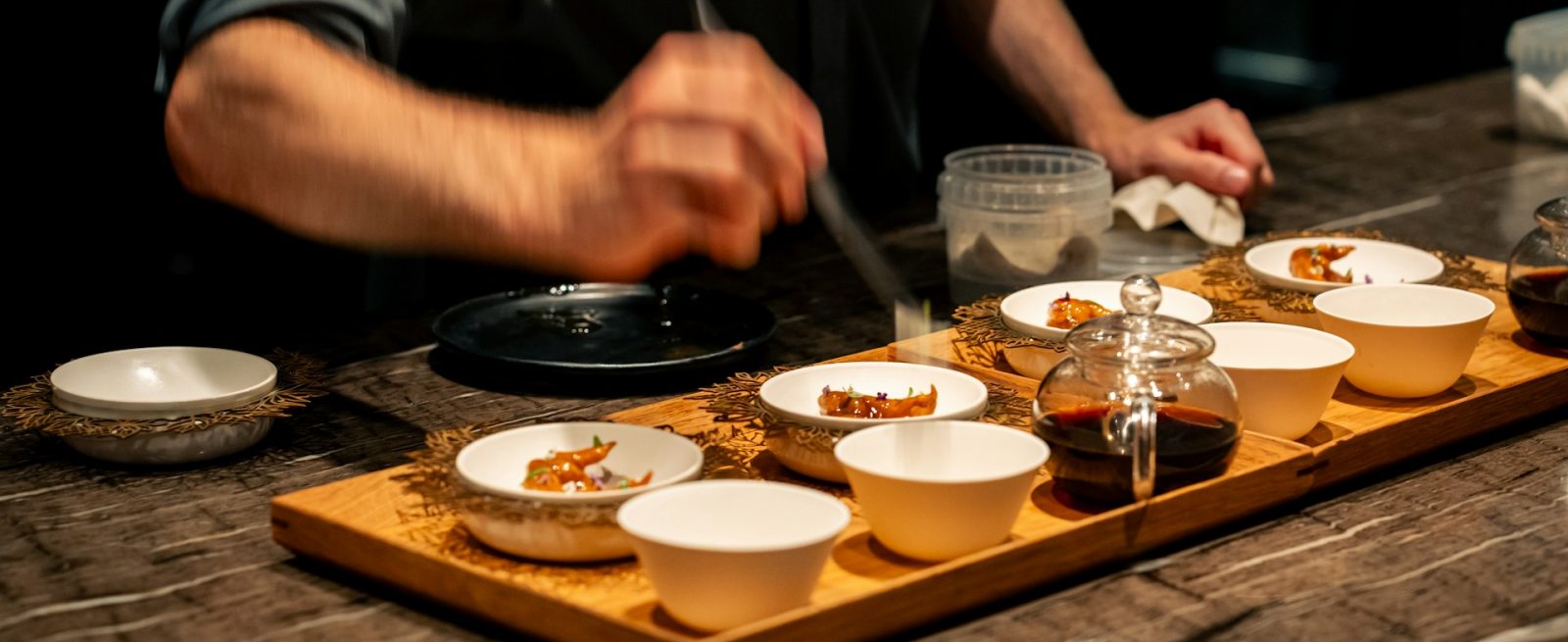Cultivating a Chef’s Mindset for Growth in Hospitality
6 Min Read By Chef Franck Desplechin
We love to talk about excellence in hospitality. We obsess over service standards, daily rituals, KPIs (Key Performance indicator), guest satisfaction scores, and strategy decks. We love to polish the surface to perfection. But real, authentic and true excellence? True excellence does not come from laminated values or framed mission statements. (We love to do that across the industry). It begins long before the service starts, long before the guest arrives. It starts with the right mindset.
This is the part of the conversation that too often gets skipped. We roll out new initiatives, we adopt new technologies, we re-write training manuals, and yet the results plateau. The culture does not want shift. Teams comply but there is no transformation. Energy spikes for a quick moment and then tends to fade back to familiar rhythms. We keep tinkering with the mechanics when what really needs to evolve is the mentality that drives them.
In most kitchens, curiosity is not optional; it is oxygen in the air. The best chefs are constantly asking, 'What if?'
The chef’s mindset is one of the most powerful frameworks I have ever witnessed and experienced to catalyze this shift. Forget the caricature of the angry, egocentric chef throwing pans, but the real mindset that lives behind the pass: disciplined creativity, relentless standards, adaptability under pressure, the patience to climb without shortcuts, and an intimate relationship with failure that fuels growth instead of fear. When this mindset is alive, everything sharpens, execution, culture, leadership, performance. When it is absent, no system, no strategy, no amount of surface polish can fill the void.
In most kitchens, curiosity is not optional; it is oxygen in the air. The best chefs are constantly asking, “What if?” What if there is a better way to prep this? What if service could flow more smoothly? What if today we could be a little sharper than yesterday? That questioning spirit is what keeps teams from drifting into complacency. It is ultimately what drives innovation or daily refinement, as well as the quiet obsession with progress that defines truly great hospitality. Over time and in recent years, many organizations will lose or have already lost that spark. Procedures become habits, habits become unquestioned rituals, and curiosity gets replaced by compliance. People execute tasks and hit numbers, but sadly, they stop exploring. Excellence shifts from being created to being managed. This does not happen overnight; it is a very slow erosion that sets in when leaders stop modeling curiosity themselves. A culture that no longer questions its own processes is one that has quietly chosen stagnation over growth. That is a silent killer!
It is important to know that curiosity alone does not get the job done. In the kitchen, it must always be paired with discipline. Every prep list, every repetition, every small detail exists to build a foundation sturdy enough to support creativity. There is nothing glamorous about the repetitive grind of daily discipline, but well, that is where excellence lives. Some would say that “you rise to the occasion”; I like to think that “you fall to the level of your habits”. And the habits in a great kitchen are exacting. This is often where hospitality outside the kitchen starts to unravel. We love the idea of innovation, but we undervalue the rigor required to sustain it. We celebrate the launch of new initiatives, but not the quiet consistency that makes them stick. A chef’s mindset treats discipline not as rigidity, but as a shared language that binds the team. It is the daily pre-shifts that happen even on the most chaotic days. It is the insistence that “almost right” is not good enough, not out of ego, but out of respect for the craft. Discipline is the structure that allows excellence to repeat itself reliably, like second nature.
A chef’s mindset treats discipline not as rigidity, but as a shared language that binds the team.
And then there is pressure. In a kitchen, pressure is constant. Tickets stack, burners flare, timing is everything, every second count, and for some, unfortunately there is nowhere to hide. Pressure arrives and exposes the truth. It shows who is prepared, who can adapt, who can keep their composure when it matters most. Chefs do not run from pressure; they love it, they almost need it daily to function, because they train for it. They build systems and mindsets that thrive inside it. In broader hospitality operations, pressure is often treated like a threat to be avoided or a simple problem to be solved away. We either cushion teams from it entirely, creating fragile systems that collapse under strain, or we glorify burnout as proof of toughness. Neither approach will build the resilience that is required to thrive in this industry. The chef’s mindset accepts ( and need) pressure as part of the environment, something to be embraced with readiness and shared responsibility. It is never romanticized and never feared. It is used as the ultimate teacher.
I like to think that ambition is another piece often misunderstood. In kitchens, everyone wants to rise; faster, higher, better. Ambition is powerful fuel, but without patience, it burns hot and fast, leaving very little behind. Believe, I have lived it and I have seen ambitious cooks push too hard, too soon, expecting titles before foundations were laid. If only growth work that way. Mastery takes so much time. It is forged through repetition and the willingness to climb slowly, deliberately. In today’s society and ultimately in the hospitality landscape, the addiction to speed is everywhere. Quick promotions, overnight results, rapid scaling. I strongly believe that we have blurred the line between ambition and entitlement, confusing the desire for success with the readiness to earn it. A chef’s mindset tempers drive with patience, not to hold people back, but to make their professional identity meaningful. It understands that real growth compounds over time, and those who endure the climb emerge stronger and so much more capable.
And when mistakes happen; and they always do; the mindset is what makes the difference. Failure in many organizations is treated like something to hide or punish. Regrettably people avoid taking risks, teams play it safe, and learning slows to a crawl. Kitchens operate differently. Failure is immediate and visible: a broken sauce, a misfired dish, a timing miss. There is no hiding it. And because it is right there, it gets addressed fast. Not with theatrics, but with clear eyes. Failure becomes feedback, not finality or a personal attack on your identity. That cultural difference is enormous. When teams stop fearing failure and start using it, everything accelerates. Guarantee! Post-mortems become productive, lessons are shared openly, and accountability is not about casting blame; it becomes about growth only. When leaders model this themselves, owning mistakes without ego, the mindset spreads very quickly. Some facts: People follow what they see, not what they are told.
When the mindset is strong, even imperfect systems can thrive because the people inside them are constantly adapting and most importantly improving.
All of this comes back to one simple truth: mindset before mechanism. You can design elegant systems, write flawless training guides, and hire consultants to optimize every operational detail; but if the mindset is not right, those mechanisms will eventually fail. It is a promise! Conversely, when the mindset is strong, even imperfect systems can thrive because the people inside them are constantly adapting and most importantly improving. Adopting a chef’s mindset is about bringing its core mental frameworks; curiosity, discipline, resilience under pressure, patient ambition, and a strong and obsessive learning-oriented relationship with failure; into the DNA of the organization.
Don’t see it as a slogan, or a campaign, or even a leadership retreat exercise. It is a daily way of thinking, working, and leading.
Culture will always follow behavior, not speeches. Walk the talk! A leader who avoids hard conversations builds a culture that avoids them too. A leader who glosses over mistakes creates a culture of fear. You must be the leader who embodies the mindset; who questions, sharpens, endures, and learns in public; creating a visceral ripple effect. The tone is set at the top, but it lives or dies in the daily behaviors of everyone.
Frankly speaking, this is the real competitive edge. Concepts can be copied. Technology can be bought. Strategies can be shared. But mindset; the lived, practiced, ingrained way of showing up; That can’t be faked. No way!
This is a wakeup call! The industry has spent too long polishing the surface while ignoring the core. Excellence is built by people who think differently. The chef’s mindset is not a metaphor. It is a blueprint for growth. And it is time we stopped treating it as something that belongs only behind the pass.


